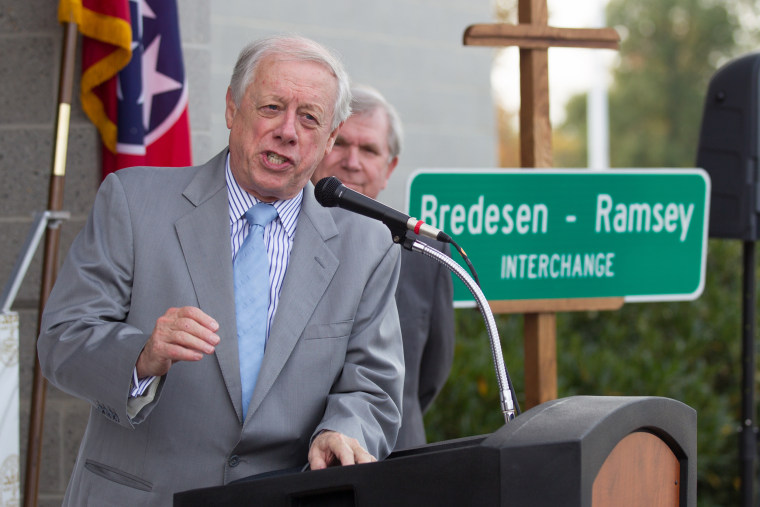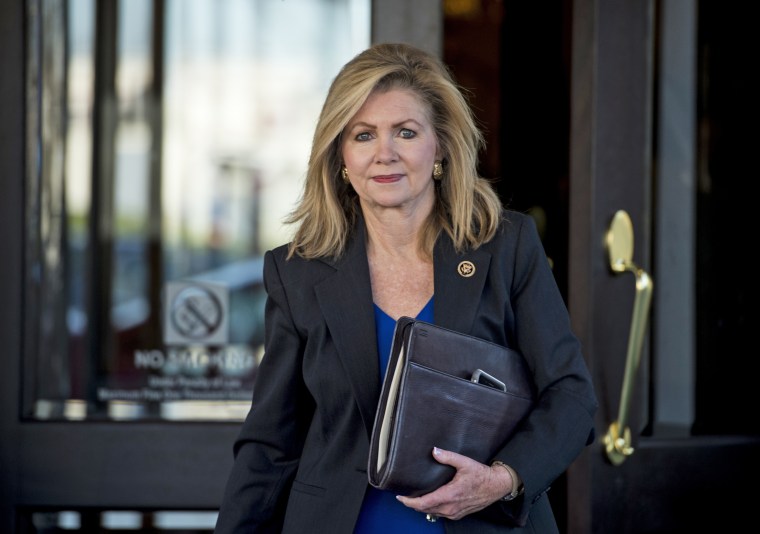WASHINGTON — Marsha Blackburn was a Trump Republican before Donald Trump was a Trump Republican.
The eight-term House member from the Nashville suburbs, who entered Congress amid a bumper crop of socially and fiscally conservative Republican freshman in 2002, quickly made her mark as as a sharp-tongued advocate for ending abortion, protecting gun rights and fighting gay marriage.
She's also stood out on Capitol Hill for her insistence on being called "congressman," not congresswoman — evidence of her aversion to "political correctness" and possibly a nod to the fact that her home state has never elected a woman to its highest statewide offices.
Now she's the GOP Senate candidate in a state currently represented by two Republican senators — a state that voted decisively for Donald Trump, who will appear with her at a campaign rally there Tuesday. But Blackburn, hoping to break the Volunteer State's glass ceiling in the U.S. Senate, has so far found herself in the fight of her political life against former two-term Democratic Gov. Phil Bredesen.

While Tennessee is a solidly Republican state, Blackburn's candidacy is serving as a test of just how conservative — and how Trump-aligned — it has become.
There's no doubt that Trump himself is aligned with Blackburn. Long before his Tuesday visit to a Nashville rally to boost her bid, The Great American Alliance — a pro-Trump advocacy group with ties to Breitbart and former Trump adviser Steve Bannon — endorsed her early.
Tennessee's partisan stats would seem to be overwhelmingly in her favor: Donald Trump won it with 61 percent of the vote. No Republican presidential nominee has taken less than 55 percent of the vote since George W. Bush got 51 percent against home-state Democrat Al Gore in 2000. And a Democrat hasn't won a Senate seat there since Gore was re-elected in 1990.
Trump's popularity rating also remains significantly higher in Tennessee than it does nationwide —which makes running a Trump-flavored campaign the right strategy for Blackburn, says Tennessee GOP Executive Director Michael Sullivan. "Among active voters that are likely to participate in 2018, Trump's approval rating is very high, and not without cause," he said. "There are a lot of jobs, a lot of bonuses at Dollywood, McKee Foods, FedEx, all thanks to the president's tax cuts. And every single one of those voters attribute these bonuses to Trump's tax cut."
And yet Bredesen, whose 2006 re-election marked the last time a Democrat won a statewide race in Tennessee, has held a lead in the three major public polls taken in the state. While a recent Mason-Dixon poll pegged his edge at 3 points, within the poll's margin of error, a survey taken by Middle Tennessee State University in March found him up 10 points. To claim victory, he'd need to claim crossover votes.
In a Vanderbilt University poll released earlier this month, 69 percent of independent voters viewed Bredesen favorably, to 44 percent for Blackburn. And while just 23 percent of Democrats surveyed had a favorable impression of Blackburn, Bredesen's favorability rating among GOP voters was more than twice as high, at 52 percent.
"There's a dramatic overestimation of how conservative the state is," said Josh Clinton, a Vanderbilt Political Science Professor who co-directed the poll with John Geer. "There are problems in the nation and the state, and people want problem-solvers and solutions, not bomb-throwers and partisan rhetoric."
Despite Tennessee's reputation for being staunchly conservative, a Vanderbilt University poll suggests that the state is split evenly between conservatives (48 percent) and those who identify as moderates (31 percent) or liberals (17 percent). The poll also indicates the state's attitude towards bipartisanship: 76 percent of voters say they want their representatives to reach across the aisle, even if it means compromising on their own ideology.
The state's two senators, Republicans Bob Corker and Lamar Alexander, come from the establishment wing of the party. Corker, who has feuded with Trump at times, chose not to run for renomination, creating an opening for Blackburn. She has voted with the president more than 90 percent of the time since his inauguration last year and touted her support of the border wall and standing for the national anthem — one of Trump's go-to cultural issues — in a video announcing her campaign.
What she's banking on is the Tea Party tilt not only of the Republican Party but of the state as a whole. Conservative populism has had a resurgence in the South over the past decade, and Tennessee is no exception. The American Conservative Union, which has close ties to Trump, has rated the state's legislature the most conservative in the nation repeatedly in recent years.
But the drawing of state legislative and congressional district lines means that the results of contests in individual districts may not reflect the overall statewide breakdown, and Democrats say Blackburn may be too conservative for the Tennessee electorate. They worked hard to recruit Bredesen, who is moderate in style and substance, often shying away from culture issues such as abortion and guns. The former governor remains popular among many establishment Republicans and business leaders.
That's because his record as mayor of Nashville and governor of the state demonstrated a business-minded approach to governance. As mayor in the 1990s, he jump-started the city's growth by bringing in NHL and NFL teams, and, as governor in the following decade, he made hard fiscal choices, including cutting Tennessee's Medicaid program, to balance the state budget.
In contrast to Blackburn, a light-up-the-base politician who is at home in high-octane cable television debates, the 74-year-old Bredesen is a somber throwback who neither looks nor sounds much like the resistance-style candidates fueling Democratic Party energy in other parts of the country.
Bredesen, a former CEO of HealthAmerica Crop., opposed the Affordable Care Act when it passed. In 2009, when his name was floated for secretary of Health and Human Services, progressive groups and single-payer advocates circulated petitions against him, citing his decision to cut Tennessee’s Medicaid program as a disqualifier.
He supports universal background checks and, as governor, vetoed a bill that would allow guns in bars and restaurants. He did not participate in the March for Our Lives demonstrations in Tennessee, however, unlike many other state Democrats.
Richard Krieg, a Knoxville attorney and former Republican member of the state legislature, voted for Bredesen in his first run for governor and is considering who to throw his support behind this November. "Bredesen is setting a tone that I believe is appealing to many people and is effective in a time when so many of us are disgusted with the nastiness of partisan politics," said Krieg.
This appetite for moderation has been seen in other parts of Trump country. The surprising victories of Doug Jones in the Alabama Senate special election in December and Conor Lamb in a Pennsylvania House special election in April suggest that Democrats can beat Trump-style Republicans in places that the president defeated Hillary Clinton in 2016.
Bredesen would have no chance if Tennessee voters think he's answering to the beck and call of congressional Democratic leaders Chuck Schumer and Nancy Pelosi. But right now, that's not the case.
"I do want to see the best person elected," Krieg said. "And if that's a Democrat, then I am okay with that."
